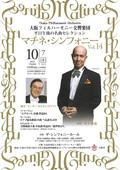


ベートーヴェン : 「エグモント」序曲 作品84 モーツァルト : ピアノ協奏曲第19番 ヘ長調 K.459 / ピーター・ゼルキン[pf] ドヴォルザーク : 交響曲第9番 ホ短調 作品95 「新世界より」 大阪フィルハーモニー交響楽団
I had a chance to perform two Mozart concertos consecutively with the Osaka Philharmonic Orchestra. The 25th one in C major with Till Fellner as the soloist was a great success! As for the 19th in F major with Peter Serkin, I played together with him only once before, but it happened too long ago for me to remember…
I have to say that, Till Fellner is much less famous than “Till Eulenspiegel's Merry Pranks”, a well-known piece for any music fan here in Japan. However, his interpretation was truly authentic, and plenty of rehearsals with the orchestra paid off, too. As a result, we successfully drew all the sides of Mozart out of the concerto. I think this work’s essence reached each and every corner of the Kyoto Concert Hall, an acoustically somewhat challenging venue. (Making the orchestra smaller was also effective.)
The concert with Peter Serkin took place three days later. What I remember of him is that, in my 20’s, he had played works by Toru Takemitsu many times.
He seems to embody, in his calm bearing, “An America that cannot completely coordinate its anfractuous mind”. Thus his music brought shades to Mozart in an entirely different manner from Fellner.
Peter’s pianism was wonderful. But if I mention it at the risk of being misunderstood, he was taking techniques for Beethoven to Mozart music, such as, for example, stressing the resolved note in chord progressions similar to the Amen Cadence. (It’s not impossible for conductor to discuss thoroughly with soloist to urge him to reconsider his interpretations. But this might spoil his qualities. Furthermore, the time we had to rehearse was limited, this time around. ) Then I decided to follow him, and I think that’s a fine attitude in its own right in the music world.
My former teachers Hideo Saito and Sergiu Celibidache never made any compromise like that. Even I hadn’t been able to assume such an attitude for a long time.
But as a reality, once in a while, Asian musicians such as Kyung-Wha Chung and Fou Ts'ong or Americans from Van Cliburn to Leonard Bernstein, whose manner of interpreting deviated from the so-called traditional musical culture of Europe, brought a new horizon to the classical music.
Let’s say Seiji Ozawa, too, absorbed this traditional European music as that of another world’s. He has been sacred to those who wished to enlarge the classical musical world, and reversely he has been considered the opposite and boycotted. Today, musicians from Venezuela probably play the same role.
After the concerto, Peter gave an excerpt from the Goldberg variations as his encore for the audience who didn’t want to stop clapping in appreciation.
After coming backstage, he said, “I’ve never given any encore after a concerto performance so far. I did today without knowing why!”
By the way, the Osaka Philharmonic Orchestra performed “Don Giovanni” and “Scheherazade” (our concert master Mr. Choi’s solo was excellent!) without restraint in Kyoto. They also gave a fresh, new performance of “Egmont” and the “New World Symphony” in Osaka. In both concerts, the orchestra succeeded in showing its original points such as its improvisatory mood and its dynamism.
On the same day, I myself suffered from sore throat because of a gathering to support the orchestra. Well, I’m not singer…
2025年1月 1
2024年12月 4
2024年11月 7
2024年10月 4
2024年9月 3
2024年8月 1
2024年7月 2
2024年6月 7
2024年5月 8
2024年4月 5
2024年3月 4
2024年2月 7
2023年12月 4
2023年11月 1
2023年10月 3
2023年9月 1
2023年8月 3
2023年7月 2
2023年6月 5
2023年5月 5
2023年4月 2
2023年3月 3
2023年2月 1
2023年1月 3
2022年12月 7
2022年11月 3
2022年10月 1
2022年9月 3
2022年7月 4
2022年6月 1
2022年5月 6
2022年4月 3
2022年3月 6
2022年2月 5
2022年1月 5
2021年12月 4
2021年11月 5
2021年10月 4
2021年9月 3
2021年8月 2
2021年7月 5
2021年6月 6
2021年5月 3
2021年4月 2
2021年3月 5
2021年2月 3
2021年1月 3
2020年12月 5
2020年11月 3
2020年10月 4
2020年9月 2
2020年8月 2
2020年7月 4
2020年6月 2
2020年4月 3
2020年3月 5
2020年2月 1
2020年1月 2
2019年12月 3
2019年11月 4
2019年10月 2
2019年9月 3
2019年8月 2
2019年7月 5
2019年6月 5
2019年5月 5
2019年4月 4
2019年3月 5
2019年2月 4
2019年1月 3
2018年12月 6
2018年11月 3
2018年10月 4
2018年9月 4
2018年8月 1
2018年7月 1
2018年6月 3
2018年5月 5
2018年4月 4
2018年3月 8
2018年2月 12
2018年1月 6
2017年12月 11
2017年11月 4
2017年10月 6
2017年9月 9
2017年7月 6
2017年6月 4
2017年5月 7
2017年4月 2
2017年3月 4
2017年2月 4
2017年1月 2
2016年12月 6
2016年11月 8
2016年10月 1
2016年9月 2
2016年8月 3
2016年7月 8
2016年6月 4
2016年5月 8
2016年4月 5
2016年3月 4
2016年2月 5
2016年1月 5
2015年12月 8
2015年11月 5
2015年10月 6
2015年9月 11
2015年8月 2
2015年7月 3
2015年6月 8
2015年5月 5
2015年4月 6
2015年3月 8
2015年2月 2
2015年1月 8
2014年12月 1
2014年11月 4
2014年10月 4
2014年9月 4
2014年7月 1
2014年6月 1
2014年5月 1
2014年4月 10
2014年3月 4
2014年2月 1
2014年1月 6
2013年12月 1
2013年11月 2
2013年10月 1
2013年9月 1
2013年7月 1
2013年6月 1
2013年5月 1
2013年4月 2
2013年3月 2
2013年2月 1
2013年1月 1
2012年12月 1
2012年11月 1
2012年10月 1
2012年9月 1
2012年8月 1
2012年7月 1
2012年6月 1
2012年5月 1
2012年4月 1
2012年3月 1
2012年2月 1
2012年1月 1
2011年12月 1
2011年11月 1
2011年10月 1
2011年9月 1
2011年8月 1
2011年7月 1
2011年6月 1
2011年5月 1
2011年4月 1
2011年3月 1
2011年2月 1
2011年1月 1
2010年12月 2
2010年11月 9
2010年10月 3
2010年9月 12
2010年8月 2
2010年7月 3
2010年6月 3
2010年5月 8
2010年4月 6
2010年3月 5
2010年2月 2
2007年12月 6
2007年11月 8
2007年10月 4
2007年9月 8
2007年8月 2
2007年7月 4
2007年6月 2
2007年5月 4
2007年4月 1
2007年3月 3
2007年2月 2
2007年1月 3